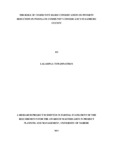| dc.description.abstract | Protected areas have always been seen as a kind of alien elements, another heritage from colonial times, mostly more beneficial to tourists from rich countries than the country's own poor population especially the people living around the parks. The problem with many of the past efforts to conserve nature has been that nature conservation has taken place without paying any attention to the interests and needs of local people. Local communities seldom had any advantages from tourism. The income primarily went to the tourism industry and to the central government. In most cases only a limited part of the revenue was reinvested in the parks and an even smaller part was allocated to development of local communities' adjacent to the protected areas. The purpose of this study was to determine the role of community based conservation on poverty reduction in Westgate Community Conservancy in Samburu County.
This study was a descriptive survey. Descriptive survey was preferred for it is used to obtain information concerning the current status of a phenomenon. The population for this study was the seven management official of the Westgate conservancy and the 987 community members living in areas surrounding Westgate conservancy. The research used a census approach to pick all the seven management staff in Westgate conservancy. As for the community living in areas immediately surrounding Westgate conservancy, the study used systematic sampling to select the manyattas and then select the head of households within the manyattas using purposeful sampling so as to come up with 10% of the target population. The researcher therefore selected 98 community members from areas surrounding Westgate conservancy. The sample size of this study was 105 respondents.
A questionnaire was used to gather information from community members from areas surrounding Westgate conservancy. In addition, the study also used interview guides to collect data from the seven management officials in Westgate conservancy. Both descriptive statistics and inferential statistics were employed in the analysis. The study found that improved security influences poverty reduction at Westgate Community Conservancy in Samburu County most followed by enterprise development, institutional governance, improved range management and wildlife conservation was influencing poverty reduction least. The study recommends that the government and non-governmental organisations should focus on improving infrastructure of the area and also enhance the accessibility of financial resources to the residents for them to come up with businesses that are related to tourism for instance hotels and restaurants. This study also recommends that a lot of attention and resources be accorded to the security docket. This will ensure that tourism will thrive and with it the economy of this region. | en_US |

